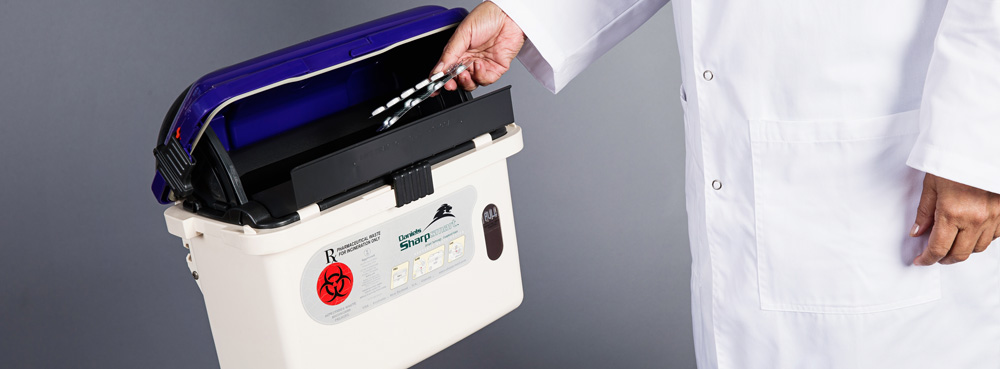How to Dispose of Pharmaceutical Waste and Meet Regulations

Pharmacies inevitably generate pharmaceutical waste, making it essential to implement a comprehensive and compliant waste management plan. Whether operating as a stand-alone pharmacy or within a larger healthcare facility, establishing a clear and effective strategy for waste segregation, collection and disposal is crucial to ensuring regulatory compliance and environmental responsibility.
TOPICS WE WILL COVER:
- How Is Pharmaceutical Waste Defined?
- Which Color Container Indicates Pharmaceutical Waste?
- How to Properly Dispose of Pharmaceutical Waste
- Who Regulates Pharmaceutical Waste?
- Is Your Pharmacy Compliant?
- Ensure Compliance with Daniels Health
How Is Pharmaceutical Waste Defined?
Pharmaceutical waste is defined as any chemical or biological product medicine that is intended for use in the diagnosis, cure, mitigation, care, treatment or prevention of disease or injury of a human or other animal. To learn more about what is considered pharmaceutical waste, read our blog here.
Classifications of Pharmaceutical Waste
Pharmaceutical waste considerations are categorized under a number of categories including:
- RCRA Hazardous Pharmaceuticals
- Non-Regulated Pharmaceuticals
- Non-Hazardous Pharmaceuticals
- DEA Controlled Pharmaceuticals
Which Color Container Indicates Pharmaceutical Waste?
Each pharmaceutical waste container color is assigned to a specific type of waste to ensure proper segregation and compliance. For example, black containers are commonly designated for hazardous pharmaceutical waste, while non-hazardous pharmaceutical waste should go into a purple container, as shown in Daniels’ Pharmasmart.
Adhering to a pharmaceutical waste container color coding system is a crucial best practice in healthcare waste management, helping to enhance safety, ensure regulatory compliance and minimize environmental impact.
How to Properly Dispose of Pharmaceutical Waste
Proper disposal of pharmaceutical waste involves several key steps:
1. Segregation
Properly segregate pharmaceutical waste based on its classification. This is crucial for ensuring compliance and cost-effective disposal.
2. Containment
Use the appropriate pharmaceutical waste container color for different types of waste:
- Black containers: Typically used for hazardous pharmaceutical waste
- Purple containers: Generally designated for non-hazardous pharmaceutical waste
Read this blog to learn more about what goes into a pharmaceutical waste container.
3. Collection
Ensure regular collection of pharmaceutical waste containers by trained personnel. Note that hazardous pharmaceutical waste must be transported to a RCRA-permitted facility using a uniform hazardous waste manifest.
4. Treatment or Redistribution (If Applicable)
Different types of pharmaceutical waste require specific treatment or distribution methods:
- Hazardous waste – required to use a hazardous waste incinerator
- Return to pharmacy stock – applicable when the facility/and or payer contracts mandate credits for unused medications, as long as medications meet return guidelines
- Reverse distribution – typically appropriate for pharmacies or in the case of creditable expired drugs still contained within original manufacturer packaging
- Non-hazardous pharmaceutical waste – may be incinerated at a medical waste treatment facility or waste to energy processing plant.
- Trace chemotherapy drugs – to be incinerated at a medical waste treatment facility
5. Final Disposal
Final disposal must comply with all applicable federal, state and local regulations.
Who Regulates Pharmaceutical Waste?
The Environmental Protection Agency (EPA) and Resource Conservation and Recovery Act (RCRA) regulations provide guidelines for pharmaceutical waste.
On top of federal regulations, individual states also employ additional regulations regarding chemotherapy waste, infectious waste, and sharps container disposal. Management of pharmaceutical hazardous waste is probably the trickiest waste stream to manage, but we can help with this.
EPA Regulations and Compliance Requirements
To comply with EPA regulations, facilities must adhere to several key stipulations, including:
- Proper Classification: Non-hazardous or non-regulated pharmaceuticals are not required to be transported as hazardous waste. However, to ensure full compliance and mitigate risk, best practices recommend treating uncertain pharmaceutical waste as hazardous.
- Documentation: Hazardous pharmaceutical waste must be shipped using a uniform hazardous waste manifest and transported to an RCRA-permitted facility.
Regulatory Framework for Pharmaceutical Waste
Before 2015, Subtitle C of the Resource Conservation and Recovery Act (RCRA) provided guidelines for hazardous waste disposal and management. These guidelines covered aspects such as waste generation, transportation, storage, treatment and disposal. However, specific regulations addressing pharmaceutical waste management in pharmacies, hospitals and reverse distributors were insufficient.
To bridge this gap, the Environmental Protection Agency (EPA) introduced 40 CFR Part 266, Subpart P, which outlines specific standards for managing hazardous pharmaceutical waste. These regulations establish requirements for facilities generating potentially hazardous pharmaceutical waste, ensuring they comply with hazardous waste generator classifications under 40 CFR Part 262.
Standards of the EPA guidelines define different types of pharmaceutical waste. One such stipulation mandates that hazardous pharmaceuticals must be accompanied by a uniform hazardous waste manifest during transport and must be sent to a facility permitted under the Resource Conservation and Recovery Act (RCRA) for proper treatment and disposal.
Is Your Pharmacy Compliant?
Maintaining compliance with evolving pharmaceutical waste regulations is essential to avoid fines and penalties. All pharmacies, regardless of their location, must comply with multiple regulatory directives from agencies such as:

- Drug Enforcement Administration (DEA)-Secure and Responsible Drug Disposal Act of 2010
- Environmental Protection Agency EPA)– Best management practices for unused pharmaceuticals and hazardous waste disposal
- Centers for Medicare and Medicaid Services (CMS)– Short-cycle dispensing regulations
It is ultimately the responsibility of the waste generator to determine when such pharmaceuticals are hazardous. Discarded pharmaceuticals may be deemed hazardous waste if they are defined as a product listed under RCRA’s P or U listings, or in cases where the pharmaceutical exhibits one or more characteristics of a hazardous waste. Failure to properly identify hazardous pharmaceutical waste may incur fines and penalties. This is a lot to digest, but Daniels is here to partner with you and properly categorize your waste.
Ensure Compliance with Daniels Health
Daniels Health offers expert services to assist healthcare facilities in navigating the complexities of pharmaceutical waste management. Our formulary characterization service helps identify proper disposal, transport and treatment requirements for each medication, ensuring compliance with regulatory standards.
By partnering with Daniels Health, facilities can implement efficient pharmaceutical waste disposal processes that align with both federal and state regulations while prioritizing safety and environmental responsibility.
Don’t take chances. Get in touch with the experts in pharmaceutical waste disposal and avoid non-compliance tags or fines.
Let's Talk!
Your time is valuable, and we don’t want to play hard to get. You can either phone us directly on the details listed on our contact page, or feel free to fill out this short form and one of our team members will get back to you as quickly as possible.

